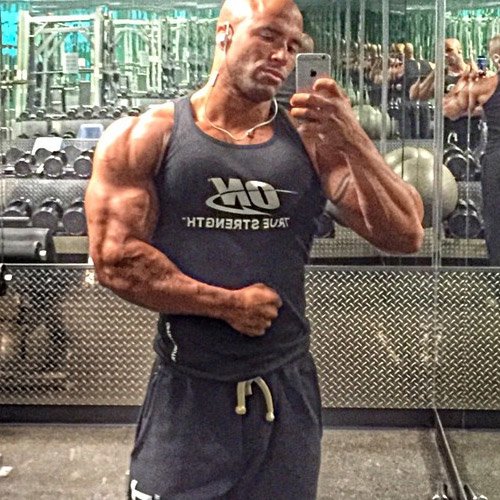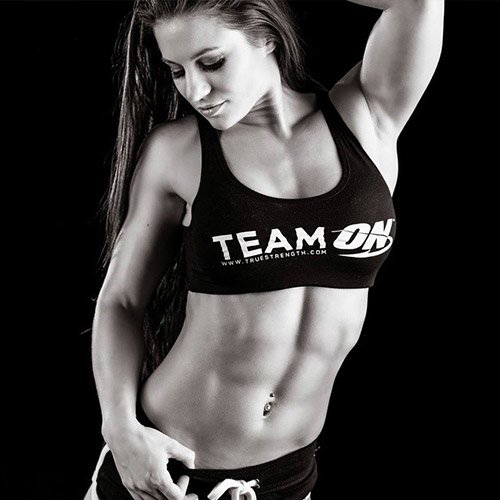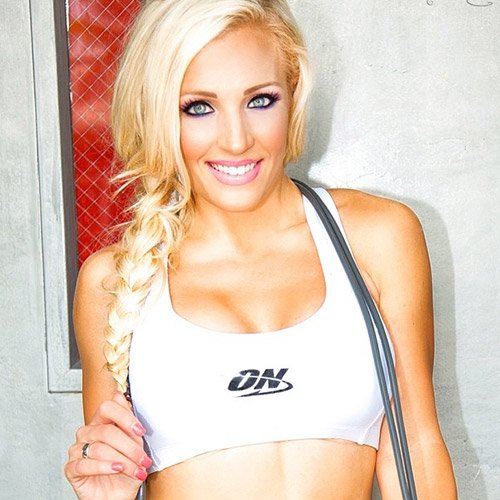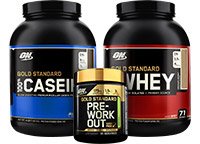
Live And Be Lean: Cutting Lessons From Physique Athletes
Speed up your fat-loss efforts with help from this roundtable of physique stars on the best ways to take it off—and keep it off.
Cutting down for a show is a rite of passage for physique competitors. But even among the elite, there are two camps. There are those who embrace the misery, cut like crazy, and only compete once or twice before getting "burned out." Then there are those who learn what they can the first time and continue to search for a more reasonable, systematic approach to shredding. They can live and be lean at the same time.
Which kind of competitor do you think you'd rather learn from? We thought so. So to get an idea of what today's physique stars consider the most important factors in losing body fat—and what's most overrated—we took the questions right to four of Optimum Nutrition's finest. They shared their personal experiences with getting lean and the lessons they learned along the way.
Whether you have dreams of setting foot on stage or not, you can put these lessons to work in your own fat-loss efforts!
Meet The Pros
QWhat's the single most important factor for reducing body fat?

Tobias Young: Nutrition, nutrition, nutrition! You can train all you want, but if you take in too many calories, then you won't be able to lose the body fat and show off your hard work. I'm sure you've heard the phrase that "abs are made in the kitchen." It's true—it's all about calories in and calories out. Make sure to take in fewer calories than you burn—in that order!

Kate Osman: Consistency in nutrition! People looking to lose weight are often seeking a "quick fix," but most of the time the quick fix isn't sustainable. This can cause yo-yo dieting, which leads to extreme dieting, splurges, and ultimately frustration. Work with a program that teaches you about nutrition for the long run.

Chelsea Beaudin: I agree with Kate about consistency. Consistency is important not only in your training but also in your diet and cardio regimen. I find that certain foods help keep me get much leaner and work better with my body then others. My foods won't necessarily be someone else's though. It's about finding what works best for you and staying consistent in your goal.
What is the most underrated aspect of fat loss?

Evan: What continues to escape most people is the importance of resistance training relative to cardiovascular exercise in any body recomposition pursuit. The physiological adaptations and metabolic responses to weight training are enormously impactful and consistent with improvements in lean body mass and ultimately fat loss.

Chelsea: I agree—strength training! So many people focus only on cardio for staying lean, when in all actuality strength training will increase lean muscle, which will help increase your metabolism and burn fat and calories, even at rest.

Tobias: I'd say sleep is definitely underrated. You have hunger and satiety signals that get thrown off when you don't get enough sleep. Aim for 8-9 hours of uninterrupted sleep whenever possible. Plus, if you're awake more hours of the day, you're also more apt to be eating or snacking during those times.
What cutting technique is the most overrated?

Evan: Long steady-state bouts of cardio are overrated [for] getting lean. As you reach higher volumes of this type of training, you start to experience metabolic and physiologic adaptations that are not favorable to sustained weight loss.

Tobias: I agree with Evan! I still hear about people doing 2-3 hours of cardio per day to lean out. That's crazy! If your diet is where it should be, you shouldn't have to do more than an hour per day at the most.

Chelsea: Another vote for cardio! If you have to spend three hours a day doing cardio, I encourage you to please look at your nutrition and lifting programs.
How do you make a fat-loss program both attainable and sustainable?

Evan: The number one factor contributing to the success or failure of any regimen is adherence. When picking a plan—or individual strategies within a plan—you must ask yourself one question: Can I see myself doing this 3, 6, and 12 months from now? The reality is, you will have to. So if you can't commit to it, choose something that's a better fit for you.

Tobias: You really need to learn two skills. One is portion control. Small, frequent meals help control blood-sugar levels and help eliminate excessive hunger and overeating. The other skill to learn: Make healthier options rather than just waiting for them to come to you. There is almost always a healthy option to make any type of dish!

Kate: Find a program you enjoy and—just as importantly—you understand. Whether it's training or nutrition, you have to understand why you're doing it. Grasp that and you'll be far more likely to continue.

Chelsea: For me it's meal prep and moderation. Having meals prepped not only saves you time, but money as well. Who can say no to those benefits? Plus, when you have healthy options readily available, it reduces the chance of mindless munching and stopping for fast foods. That said, having a cheat meal once a week can help keep you mentally sane and on track.
What's the most difficult aspect of getting lean, and how do you tackle that challenge?

Kate: Life! It can sometimes knock you off track. There are birthdays, weddings, dinners, traveling—any number of situations. I don't want to miss out on great moments because I'm worried about falling off track. Preparation is key! I prep my meals and bring them with me when possible, or I'll look into the places I'm traveling to and make sure they have a gym on-site and a grocery store nearby.

Chelsea: For me it's going out with friends. My friends can eat and do what they please, but as a competitor, I choose to make this a major priority in my life. But I still love to socialize and have fun! Plus, dancing is great cardio! I make sure to always have meals prepared, plan my day, and have plenty of food in baggies in my purse!

Evan: Long-term consistency. As your body becomes increasingly efficient at utilizing energy, any temporary excesses become more likely to be stored as body fat. This demands a high level of mental endurance, to adhere to your plan and continue making objective modifications to ensure progress ensues. Meal preparation in particular allows you to mitigate the probability of fickle bouts of emotional distress knocking you off course. Failing to prepare is preparing to fail!
What adjustments do you make to your training when getting ripped, as compared to your offseason routine?

Tobias: I keep my weight training about the same. I continue to lift heavy weight so that I maintain as much muscle as possible. Then I increase my cardio in small increments. I do 20 minutes daily in the offseason. Before a contest, I work my way up to about 45-60 minutes total, broken down into two sessions.

Evan: When bringing my body fat down I'll begin implementing high-intensity interval training at the minimum dose required to achieve my weekly progress benchmarks.

Kate: I do a lot more HIIT, as well as incorporating cardio circuits into my workouts. Traditional cardio can burn through muscle more quickly, putting you at risk of appearing "flat." Circuits help me drop body fat quickly while keeping muscle for that ripped look.
What kinds of adjustments do you make to your nutrition plan as you enter a precontest phase?

Kate: When I have an event coming up, I'll up my protein intake and cycle the amount of carbs I have daily. I'll follow a higher-carb day when my training intensity is high, and very low carb on moderate-intensity training days and rest days. While leaning out, I have a strong focus on nutrient timing: Fuel the body at specific times to help optimize macronutrient utilization and avoid fat storage.

Chelsea: I've personally found certain things work better than others close to a show. For me that's cod, tilapia, lean ground beef, salmon, veggies, and sweet potatoes. When getting close to a show, I try to cut all artificial flavorings as well as most seasonings and really go basic.

Tobias: Sixteen weeks out from competition, I keep my calories high but make sure they're all quality calories from lean sources. At 12 weeks out, I cut my calories a bit. Eight weeks out, I cut my calories a bit more and start carb cycling. Four weeks out, I adjust calories as necessary.
How has your approach to getting lean changed as you've learned more about your body?

Evan: The biggest change been to de-emphasize long and frequent bouts of low-intensity cardio. This has saved me tons of time, allowing me to streamline my entire program and focus on what provides maximum stimuli consistent with my aesthetic goals. The result is a physique far superior to the one I achieved during my days of endless hours on the elliptical.

Tobias: I've learned to prepare my meals in advance, to avoid excess calories. However, I've also realized that calories don't have to be cut too low to get results. Dropping calories too much can lower your metabolism, making it much harder to drop those last few pounds of fat.

Kate: Everyone's body is different and reacts differently to training as well as nutrition. Work with a program for a week or two, see how you feel, and adjust accordingly. Listen to your body and how you feel. We're not all created equal, and neither should our nutrition and training plans be!

Chelsea: Taking lots of progress pictures makes a huge difference. My coach Chris Evans has been with me for a very long time, and we have really worked hard as a team to watch the daily changes that take place with different protein, fat, and carb sources. Watching yourself each day is crucial to learning how to "listen to your body," as people say. Then your preps will become so much easier.







